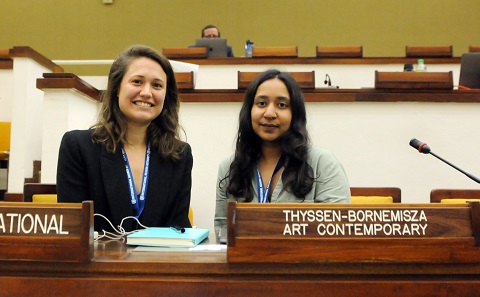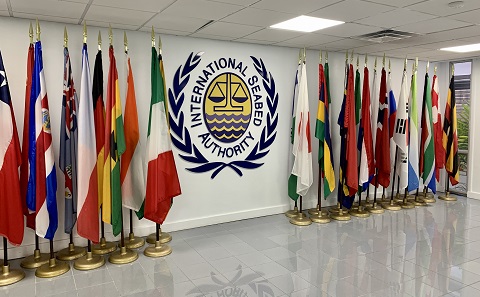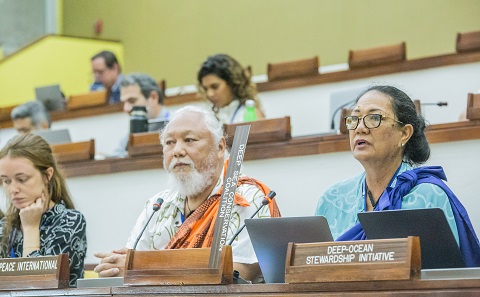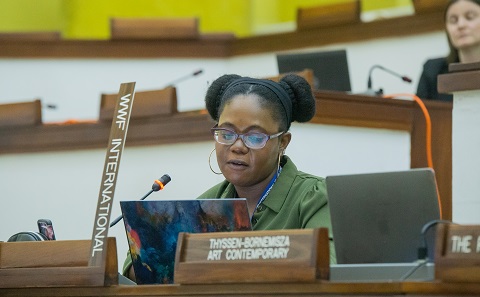Feedback from the 28th Session of International Seabed Authority (ISA)

From 16th to 31st March 2023, I, Giulia Champion, was lucky enough to attend the Council Meetings of Part I of the 28th Session of International Seabed Authority (ISA) in Kingston, Jamaica. Accompanying me was Mekhala Dave , doctoral researcher at the University of Applied Arts Vienna. Though they virtually transmitted via ISATV, one misses many side events and discussions when attending virtually. Part II and III for this session will start in July and October, respectively.

During these meetings, 19 agenda points were tackled by the ISA secretariat, the council and observers (composed of some states, NGOs, etc., find out more about how the ISA is organised here ). During these two weeks, the council continued negotiations on the draft exploitation regulations – or the mining code, a document that outlines a framework for mining polymetallic nodules on the deep seabed, a zone outside of any country’s jurisdiction, often referred to as “the Area” (see here the definition in UNCLOS).

This meeting was particularly important as the deadline for the so-called “Two-years rule”, triggered by the island-state of Nauru in 2021, was set for the 9th July 2023 - a day before the Part II meetings starting on 10th July 2023. This deadline has now been delayed to after the next meeting, as the council agreed on running a number of intersessional working groups addressing specific topics. One of these focuses on In/Tangible Underwater Cultural Heritage (UCH, see here UNESCO’s definition of UCH in the 2001 convention) and whether this notion has a place in the mining code and, if so, how to ensure its protection. This difficult discussion is organised by Clement Yow Mulalap (Federated States of Micronesia), which Mekhala and I have been attending thanks to TBA21 observer status. This discussion was started during the ISA council meetings by member states, observers, and indigenous leaders from across the Pacific. Among these were Solomon “Uncle Sol” Kaho‘ohalahala, of the Maunalei Ahupua‘a/Maui Nui Makai Network , and Hinano Teavai-Murphy, of the Tetiaroa Society .
They raised important questions concerning sovereignty and about the preservation of the ocean - a space that is their home, and ours, not only physically but also culturally. An excellent summary of the meetings by IISD ENB is available here , and an in-depth presentation by Pradeep Singh here .

These issues raise important questions pertaining to ocean and environmental justice and its intersection with colonial and imperial enterprises and histories as UNCLOS and a space such as the ISA perpetuate colonial structures. These have managed land and sea for centuries via legal language and enforcement, and these practices continue to marginalise the voices and histories of some communities. Several observers raised this point, including Mekhala Dave and Khadija Stewart , the Regional Representative of the Sustainable Ocean Alliance for the Caribbean (SOA). Khadija’s powerful closing speech reminded the room of Caribbean and Jamaican colonial history and urged caution when deciding on new extractive frameworks embedded in imperial histories and practices in a time of climate crisis.
I would like to thank the Southampton Marine & Maritime Institute (SMMI) and the TRS Horizon funding for covering my travel to and accommodation in Kingston, Jamaica, without which I could not have attended these meetings. I’m also grateful to Mekhala Dave and the TBA21 Thyssen-Bornemisza Art Contemporary Foundation : Mekhala for guiding me through the complex maze of the ISA and TBA21 for allowing me to sit on their observer delegation.
.jpg)
Top left : The ISA Council meeting room. Top right : Mekhala Dave and Giulia Champion. Bottom left : Protest outside the ISA HQ in downtown Kingston led by Greenpeace, Indigenous activists, and traditional Jamaican Maroons band. Bottom righ t: Clement Yow Mulalap. Giulia Champion, Mekhala Dave.